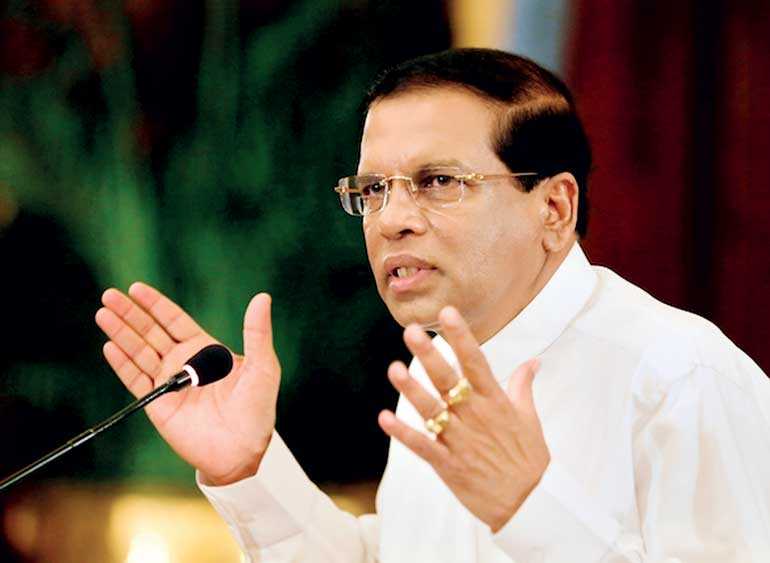Friday Feb 20, 2026
Friday Feb 20, 2026
Tuesday, 17 July 2018 00:00 - - {{hitsCtrl.values.hits}}

President Maithripala Sirisena dropped a bombshell out of the blues last week, sans all ‘maître’ (loving-kindness) when he launched a coup de main on drug offenders. He threatened to use his powers to place his signature to execute the death sentence on those sentenced for drug offenses.
Drug trafficking carries the death penalty in Sri Lanka, but since 1976 it has not been implemented. Though J.R. Jayewardene retained the death penalty in the 1978 Constitution, he never signed the death warrant but commuted it to life imprisonment. Since then, all those who held the position of the President of Sri Lanka followed this precedent and commuted all death sentences issued by the courts to life sentences.
But one solitary courageous and humane man with a conscience and common sense; Minister Mangala Samaraweera openly voiced his dissent.
He said, “I have always been against the Death Penalty and my stance has not changed. Even within the Cabinet, I voiced my opinion but the majority was for it. What is needed is, to take action against the main culprits responsible for running the drug cartels in the country. The ones that are in the prison are not the ring leaders; they are just peddlers and second level dealers. The big ones are hidden behind charity work, affluent social work organisations and religious organisations — we need a system to catch them by enforcing law and order in full force.”
Minister Samaraweera correctly points out that there is no evidence of crime rates falling in the presence of the death penalty in countries which had enforced it; and the best course of action instead is to enforce the law to the letter.
As he rightly says, this country needs more rehabilitation centres for drug addicts instead of sending them to prison, and that life imprisonment for drug dealers was a greater punishment than death, “It would kill him a little every day instead of putting him out of his misery.”
For the latter to be effective there should be no chance of parole available to the offender and locked away in a maximum, high-security prison similar to the former Alcatraz Federal Prison in the USA. Such would be a fate far worse than death!
Killing the offender by whatever means deemed ‘legal’ is the easiest way out. The challenge for the authorities concerned is to let the offender live until the end of his natural life but, away from society.
But many of us share his doubts whether, in reality, it will ever be possible to apprehend the large scale drug lords despite the death penalty!
The rich and powerful drug barons and kingpins with “connections”, with some among them, reportedly living a luxurious life in prison will pooh-pooh it all. The police in this regard are, at the best of times, caught between the devil and the deep blue sea, with political pressure of all hues bearing down on them, while some amongst them are reportedly colluding with the underworld.
Though our Police are not particularly reputed for its integrity, there are also the pearls amongst the swine who have lost their morale due to lack of political will and backing.
Furthermore, no criminal justice system is immune from error. This is a fact though most prefer not to acknowledge it. Despite the best efforts of most within the system to do what’s right and justifiable, there is always room for error. And with the death penalty enforced, the possibility of the innocent facing the hangman’s noose is inevitable.
Also, most of those who advocate the death penalty may not know or care to know the traumatic, economic, social and psychological repercussions it would inevitably have on the family members of the sentenced.
Shockingly, though it should not be, the Minister of Buddha Sasana, Gamini Jayawickrama Perera did a volte-face on his Cabinet colleague Mangala Samaraweera on the matter. He fully endorses President Sirisena’s call to revive the death penalty, while claiming to have the full backing of the Maha Sangha. He also laments, “It should have been carried out fifteen years ago.”
From the human rights perspective, capital punishment is clearly a serious human rights violation. The premeditated and cold-blooded killing of a human being defines the death penalty, and it is the ultimate violation of human rights by the State in the most cruel, inhuman and degrading way; all in the name of justice!
According to many United Nations studies across different countries and regions, there is no credible evidence whatsoever that the death penalty has a greater deterrent effect than prison terms. Thus it has no justification from the perspective of the Buddhist philosophy or international human rights law.
At the end of the day each person who favours and condones the death penalty has to reconcile it with their moral principles!
The law of karma as per the Buddhist philosophy does not recognise motive as justification to take a life, be it a human or animal, nor does it absolve one of the crime however appropriate it may seem for some.
Karmic retribution is no respecter of person, and will haunt the perpetrator and follow him/her, life after life. The design and intent to kill is the fundamental factor here, and the natural law of cause and effect that will come into force as a result, is irrevocable and unstoppable!
What moral-right has any man to decide if another should live or die!
“Hatred is never ceased by hatred. By non-hatred alone is hatred ceased. This is the eternal law” – Dhammapada.